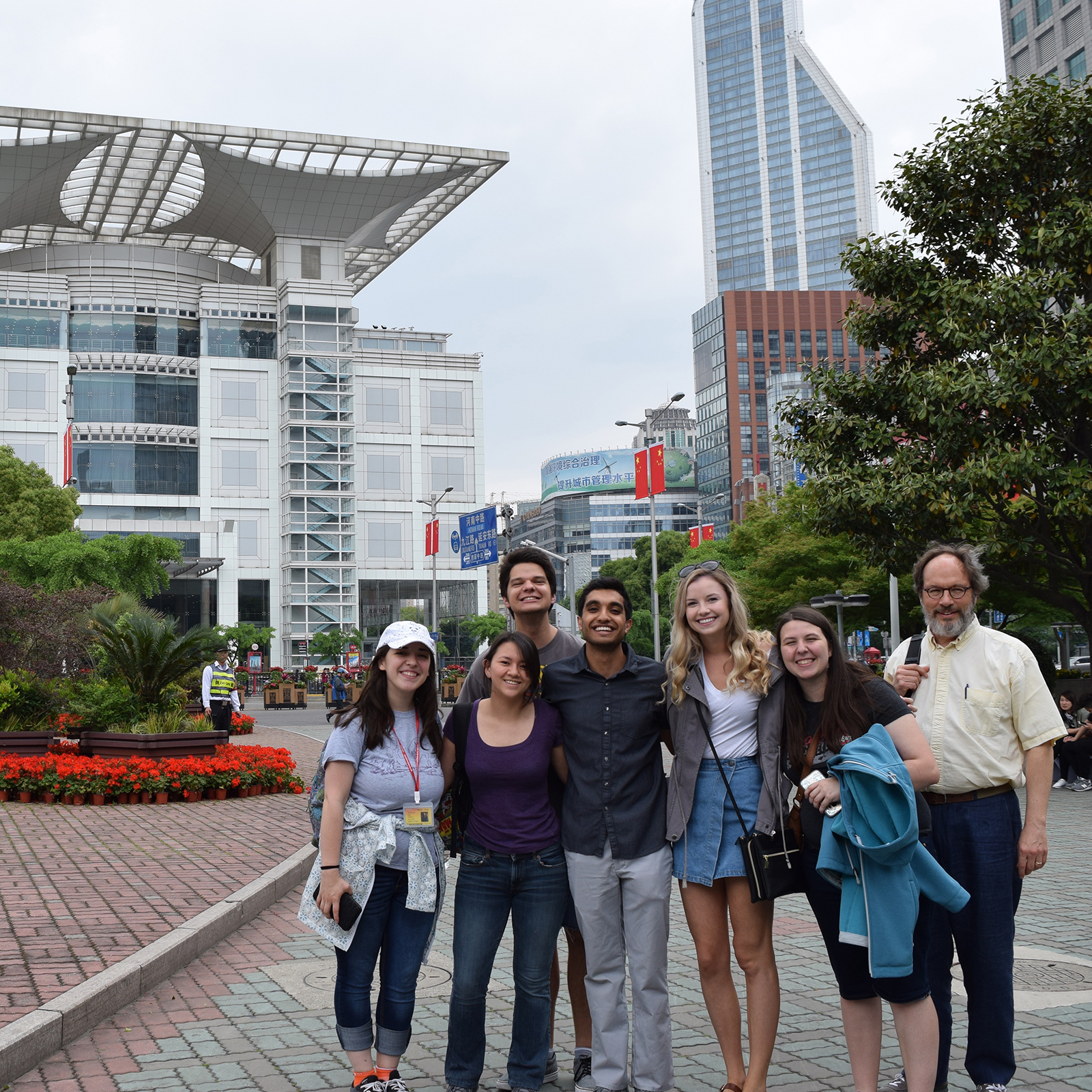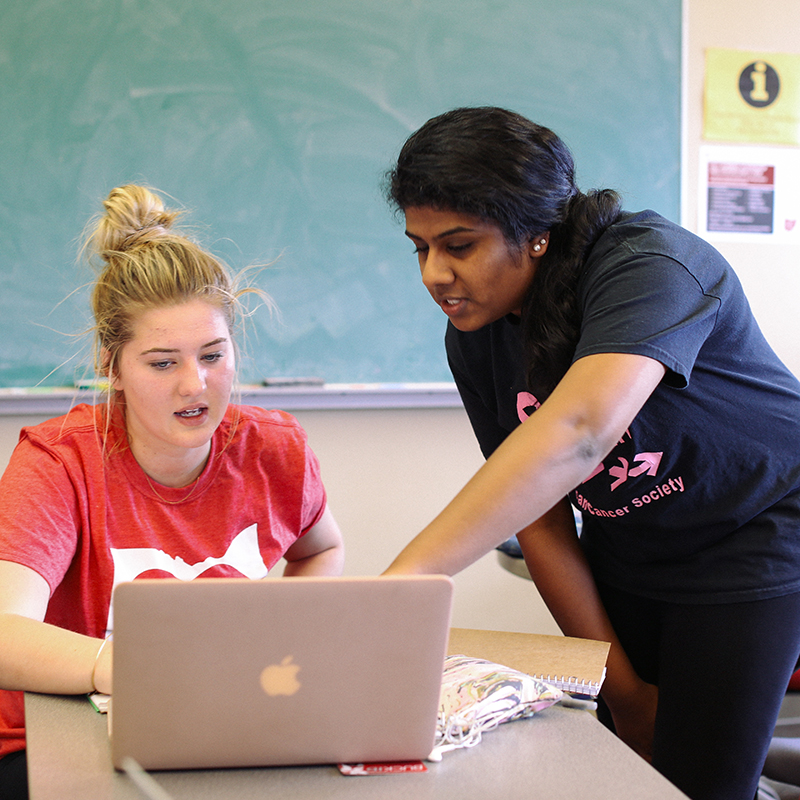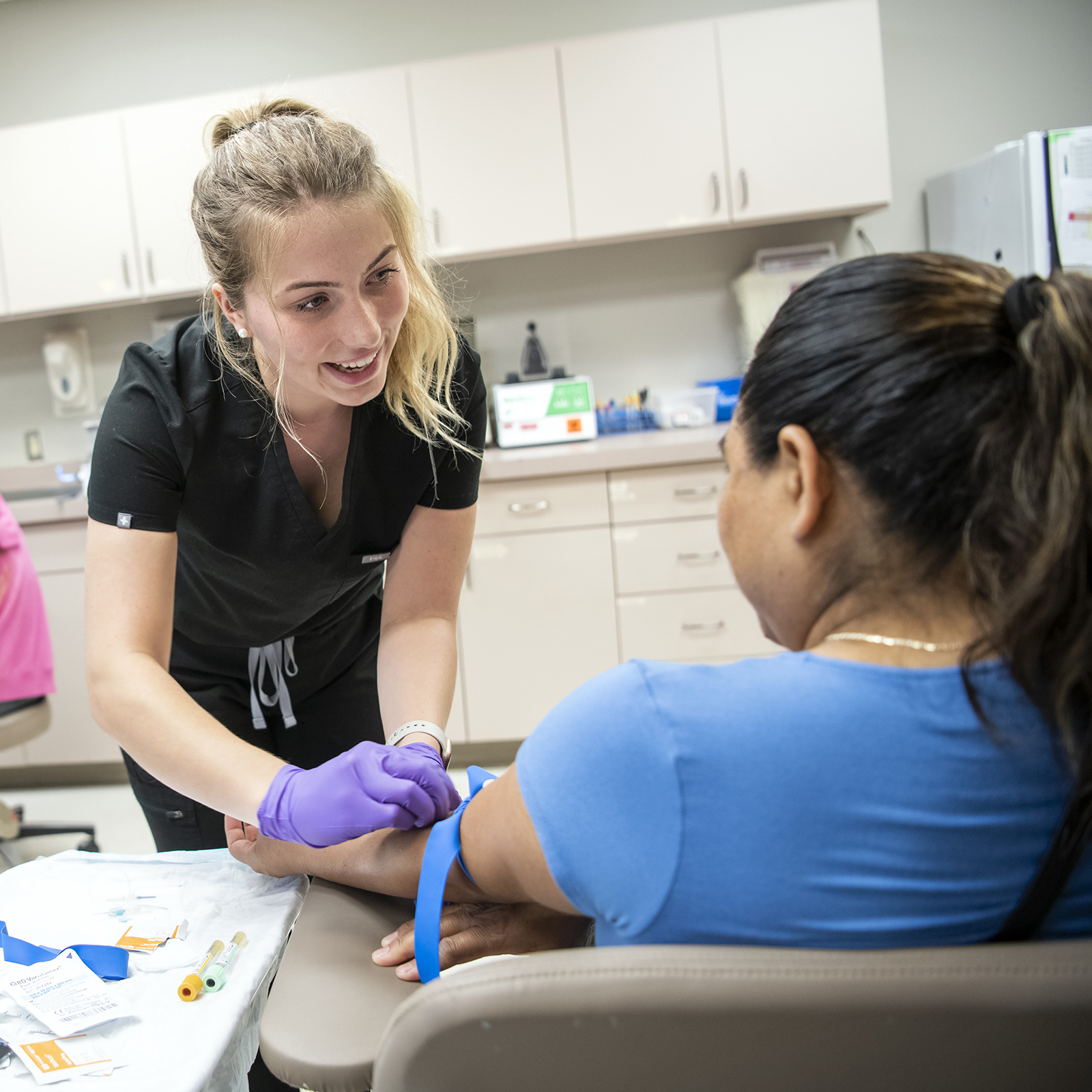In the College of Arts and Sciences, students can get involved in more ways than just the classroom. Take advantage of countless opportunities to get to know your fellow students, your professors, and the world beyond Ohio State's campus.
Getting Involved on Campus
There are over 1,400 student organizations at Ohio State, and over half of all students join a student organization. Students who choose to get involved gain leadership skills, earn better grades, grow friendships and make a big campus seem small.
Many departments within the College of Arts and Sciences have their own student organizations, and some have honor societies as well. Students can also connect with many of Ohio State's student organizations at the Student Involvement Fairs in August and January. Check out the Student Involvement Fairs webpage for the latest information.
The Arts and Sciences Student Council builds community among arts and sciences undergraduate students, faculty and administration on the Columbus campus. In support of this goal, the Arts and Sciences Student Council offers a variety of academic, social and service activities. They oversee the annual Outstanding Teaching Awards and the annual Ohio State Graduate and Professional School Fair.
In addition, Student Council members serve on various college committees including the Arts and Sciences Curriculum Committee and the Arts and Sciences Dean's Student Advisory Board. All Arts and Sciences undergraduate majors are invited to join the Student Council. Meetings are held on a regular basis and offer both leadership opportunities as well as a way for students to meet many of their peers.
The Arts and Sciences Dean's Student Advisory Board is charged with advising the College of Arts and Sciences Executive Dean and Vice Provost on matters pertaining to students: academics, communication, activities, student life and college relations.
Each year the college seeks applications to fill open positions. An email is sent to students during January with information regarding open positions, eligibility requirements, the application process, the application deadline and how to submit an application.
Keith B. Key Center for Student Leadership and Service
The Center for Student Leadership is your point of connection for the full spectrum of involvement at Ohio State. Connect with leadership and service initiatives, engage with student organizations, advance your learning and create lasting memories. The center offers programs, resources, and services for individuals and student groups to help you take the next step in your membership, leadership and citizenship. For students looking to get involved, this is a great place to start!

Undergraduate Research
Undergraduate research can be conducted independently, as part of a team, in collaboration with faculty, here at the university or elsewhere. The College of Arts and Sciences provides support for undergraduate students involved in research. There are funding sources, options for obtaining course credit, and events held throughout the year for you to showcase your research project.
Studying Abroad
For a life-changing experience, you may choose from more than 100 study abroad programs. Students who participate in study abroad programs are twice as likely to find a job within six months of graduation. They also receive 25 percent higher starting salaries, and 90 percent are accepted by first- or second-choice graduate schools.
You can earn academic credit, fulfill major or minor requirements, experience hands-on learning and gain invaluable insights. With study abroad programs in 40+ countries, Arts and Sciences students are going beyond traditional classrooms and laboratories to enhance their global perspective and understanding of the world they live in.
Each academic year begins with a Education Abroad Expo. The Office of International Affairs offers information sessions to help you begin your planning and their staff are available throughout the year to guide your program selection.
The College of Arts and Sciences offers Study Abroad Funding for undergraduate arts and sciences majors who are currently enrolled on the Columbus campus. Recipients of STEP grants have the option of applying their financial award toward a study abroad program. Students are also encouraged to ask their department about study abroad funding opportunities.
- Honors Program scholarships that apply to study abroad – the International Research Grants for Undergraduate in Arts and Sciences
- Office of International Affairs (OIA) and university funding listing and additional OIA information on study abroad
- College of Arts and Sciences study abroad funding
When you return from studying abroad, you’ll want to determine how to effectively market your international experience to prospective employers. Arts and Sciences Career Success can assist you with determining how the experience contributed to your skill set. Get guidance on how to incorporate the experience into your job search documents and interview responses. Some aspects of your time abroad will strike you as obvious good additions for your resume (maybe you got to practice a foreign language skill). The staff can assist you with determining how to best communicate the other ways in which you benefited from the experience.
Arts and Sciences students have the opportunity to travel across the globe. Some featured global education programs offered through the college include:

Internships
The Arts and Sciences Center for Career and Professional Success can help you explore career options, find an internship and plan a strategic job search. Their new website has tools and opportunities to help you prepare for your lifetime of opportunity.
Explore your interests, define a career goal and receive invaluable work experience through an internship offered either on or off campus.
You know you have potential, but employers want to know you can perform in the workplace and quickly contribute to their organizations. Completing an internship helps you demonstrate your value, and may provide a direct path to employment upon graduation. According to the National Association of Colleges and Employers 2015 Internship & Co-op Survey, employers reported converting an average of 51.7 percent of their eligible interns into full-time hires.
Finding an internship is a dress rehearsal for finding a job. When searching, you will discover employers who hire in your target career field, learn how to interview effectively and experience how networking can yield essential job leads. During an internship, you will most likely be assigned project work that involves collaborating with others, an experience that will refine your communication, problem-solving and teamwork skills.
Handshake, part of Buckeye Careers, is an online resource for Arts and Sciences students to connect with internship sites in the corporate, nonprofit and government sectors that are interested in recruiting Ohio State students. Handshake has internship opportunities available during every term of the school year. But be sure to plan ahead when starting your search, especially for summer internships, which have deadlines as early as November.

Peer mentoring
Mentoring other students is a great way to accomplish multiple career goals at once. You’ll gain direct knowledge about a profession that interests you, establish a working relationship with an Ohio State faculty or staff member who can provide you with a letter of recommendation, and obtain valuable experience for your resume.
Peer mentor experience is transferable to fields such as higher education/student affairs, counseling, advising and teaching.
Specific skills you will develop include enhanced listening skills, ability to give effective feedback, management of referral information, and, in some cases, crisis management.
Within the College of Arts and Sciences, you have many opportunities to mentor your peers. Here are a few examples:
- Students assist with resume reviews and use of Handshake as peer career advisors
- Psychology majors serve as peer mentors for entering majors
- Math majors tutor their peers at the Mathematics and Statistics Learning Center
- Honors students at the sophomore, junior and senior levels serve as a resource for first-year students in the Arts and Sciences Honors Program
Handshake, part of the Buckeye Careers Network, is an online resource for Arts and Sciences students to explore a variety of positions for strengthening their resumes and for finding career employment positions when they get closer to graduating.
Not all of the college’s peer mentor positions are posted in Handshake, so you’ll also want to contact your academic advisor about other opportunities that they might know about.
Opportunities to mentor your peers beyond Ohio State also exist. You can meet with a career prep advisor in Arts and Sciences Center for Career and Professional Success to obtain assistance with finding a these positions, evaluating how an opportunity you’ve discovered might support your career goals, and preparing your application materials.

Volunteering and Service Learning
Undergraduate students who aren’t yet qualified for internships find that volunteering is an easy step they can take early in their studies to strengthen their resumes. For students who are pursuing occupations that don’t provide direct pathways into their fields via undergraduate internships, volunteering will allow you to work with in the same sectors that align with your career goals.
You might also be looking for short-term service projects to support a community during a semester break. Participation in service learning courses will provide hands-on experience that will allow you to connect with community members who can impact your skill and career development in a variety of ways.
With the large number of nonprofit organizations in central Ohio, it is easy for Ohio State students to find a volunteer position. Ohio ranks seventh in the number of registered nonprofit organizations.
Check out these links for potential places to find volunteering opportunities.
You can meet with a Career Prep Advisor in Arts and Sciences Center for Career and Professional Success to obtain assistance with finding a volunteer position, evaluating how an opportunity you’ve discovered might support your career goals and preparing your application materials.
You can easily identify service learning courses by viewing the course list maintained by the Office of Service Learning. Each service learning course is designated with an "S" suffix in the Course Catalog.
Before enrolling in a service-learning course, you are strongly encouraged to discuss with your academic advisor how completion of a particular course will impact your degree plan.

